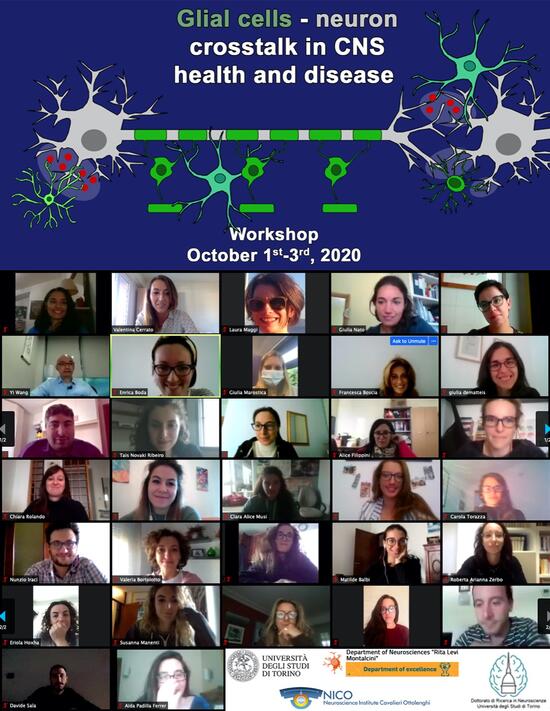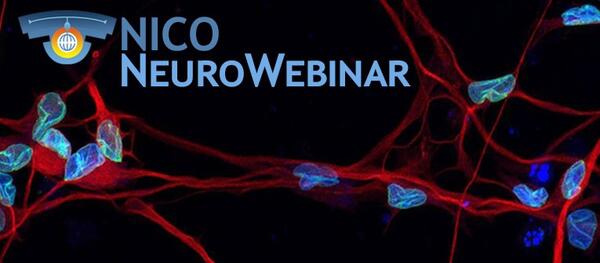OCTOBER 1
st
- 3
rd
, 2020
GLIAL CELLS-NEURON
CROSSTALK IN CNS HEALTH AND DISEASE
72 attendees from 10 countries all over the world and 25 keynote speakers participated to the Workshop
: live vibrant talks anche exciting poster discussion and
meet the expert
sessions!
Many thanks to you all for these 3 impressive days.
See you soon at the next meeting!
University of Turin - Italy
Since their discovery, glia were thought for a long time only to support neurons passively. In line with this view, neurological and psychiatric disorders have long been interpreted as the exclusive consequence of abnormalities in neurons. We now appreciate that glia operate as master regulators of numerous aspects of CNS development and plasticity. Further, dysregulations of the glial cells-neuron crosstalk can be primarily involved in initiation and progression of several neuropathologies.
The Workshop is aimed at PhD students and Postdocs with the goal to promote a thorough understanding of the functions of glial cells in health and disease. The program includes lectures on the newest conceptual advancements and methodological approaches in the study of glial cells in synaptic functions, development and CNS diseases.
The Workshop is based on a series of lectures by renowned international speakers. Participants will have the opportunity to present their own projects and discuss ideas with young experts and established leaders in the field. The program includes sessions devoted to research methodology that will allow participants to learn state-of-the-art methods to study glia-neuron interactions.
Credits: 3
COURSE ORGANIZERS
Valentina Cerrato
, Dept. of Neuroscience & NICO, UniTo
Enrica Boda
, Dept. of Neuroscience & NICO, UniTo
Annalisa Buffo
, Dept. of Neuroscience & NICO, UniTo
SCHEDULE and LOCATION
The workshop will be held on OCTOBER 1-3, 2020
via live streaming
REGISTRATION
The total number of participants will be limited to
100 students
, and registrations will be dealt with on a first come, first served basis.
Go to the registration form
E-mail addresses for information: valentina.cerrato@unito.it , enrica.boda@unito.it
ABSTRACT SUBMISSION
A total of ten abstracts will be selected for oral communications by the workshop organiziners, while the others will be presented as posters.
PROGRAM
1st day - Thursday, October 1 st 2020
Session I – Glial cells in CNS development and CNS disorders
Robert Beattie (Institute of Science and Technology Austria) - Molecular Mechanisms Regulating Gliogenesis in the Neocortex
Valentina Cerrato (University of Turin, Italy) - The ontogenesis of astrocytes diversity: a remarkably orderly process necessary for the correct cerebellar development and functioning
Najate Benamer (INSERM Paris, France) - Developmental cell death regulates lineage-related interneuron-oligodendroglia functional clusters and oligodendrocyte homeostasis
Enrica Boda (University of Turin, Italy) - Inherent heterogeneity of postnatal oligodendrocyte progenitors: lessons from a microcephaly model
Session II – Neuroscience Research Methodology (I)
Marco Perugini (Univ Milano Bicocca, Italy) - The signal and the noise: Some lessons learned from the replicability crisis in Psychology
Session III – Glia-neuron crosstalk in CNS functions and memory
Davide De Pietri Tonelli (IIT, Genova, Italy) - Bmal1-dependent control of astrocyte development and function in brain
Beatrice Vignoli (Univ of Trento, Italy) - Glial microdomains confine a “molecular memory” enabling long-term information storage for memory consolidation
Gertrudis Perea (Cajal Inst, Madrid, Spain) - GABAergic control of Astrocyte-Neuron signaling in cortical circuits
Bernadette Basilico (Inst of Science and Technology, Austria) - Constitutive role of microglia in maintaining synaptic function in mouse hippocampus
Christophe Galichet (Francis Crick Inst, London, UK) – Proliferation and differentiation of Median Eminence Oligodendrocyte Precursor Cells is required for normal function of the hypothalamo-pituitary axis.
2nd day - Friday, October 2 nd 2020
Session IV – Neuroscience Research Methodology (II)
Unveiling CNS development and glial cell heterogeneity through multi-omic approaches
Ludovic Telley (Univ of Lausanne, Switzerland) - The upcoming role of multi-omics integration in unfolding central nervous development
Gonçalo Castelo-Branco (Karolinska Institutet, Stockholm, Sweden) – Single-cell transcriptomics and epigenomics reveal disease-specific states of oligodendroglia in multiple sclerosis
Omer Bayraktar (Wellcome Sanger Institute, Hinxton, Cambridge, UK) ) – Mapping astrocyte heterogeneity using spatial genomics
Marco Prinz (Institute of Neuropathologie, University Medical Centre Freiburg, Freiburg, DE) - Novel Hexb-based tools to study microglia in the CNS
Session V – Neuroscience Research Methodology (III)
Dr Elisa Zuffi, Miltenyi Biotec - Tools for neural cells research: mouse adult brain dissociation, cell isolation and analysis
Dr Christian Feuillet, Miltenyi Biotec/Lavision Biotec – Light sheet microscopy: Principles and applications in neuroscience
Dr. Mira Deppenmeier, Miltenyi Biotec/Lavision Biotec - UltraMicroscope Blaze Virtual Demo
Session VI – Glial cells in CNS aging and pathology
Chiara Rolando (Univ. of Milan, Italy) - Post-transcriptional regulation of astrocytes: a novel facet to counteract brain aging
Rosa Paolicelli (Univ. of Lausanne, Switzerland) - Synaptic consequences of selective microglial TDP-43 depletion
Fabia Filipello (Washington University, St. Louis, USA) - Microglia immune receptor TREM2 in neurodegenerative diseases
Chiara Zurzolo (Institut Pasteur, Paris, France) - Roles of Tunneling nanotubes (TNTs) and astrocytes in neurodegenerative diseases
3rd day - Saturday, October 3 rd 2020
Session VII – Glial cells in neurodegeneration
Eriola Hoxha (Univ of Turin, Italy) - Disruption of myelin phospholipid composition impairs action potential conduction in a murine model of Spinocerebellar Ataxia type 38
Francesca Boscia (Univ of Naples, Italy) - Enhancing D-aspartate signaling to promote (re)myelination
Nunzio Iraci (Univ of Catania, Italy) - Exosomes as natural messengers of bioactive molecules in the glial-neuronal signaling in Parkinson’s disease
Antonella Consiglio (Univ of Barcelona, Spain) - Novel insights into Parkinson’s disease through iPSC-based technology
SUPPORTED BY:











